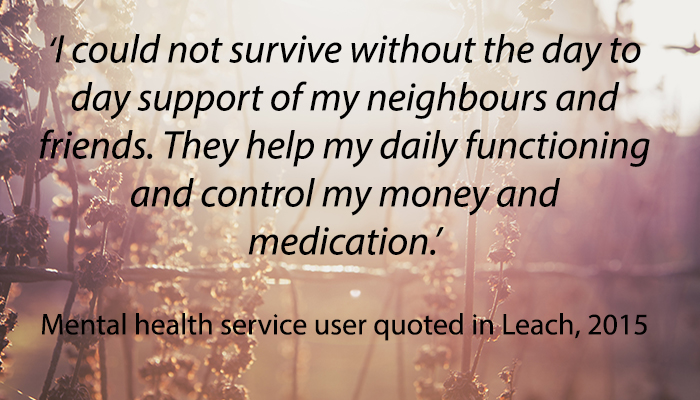
The topic of relationships and mental health deserves much more attention than it gets. Our social connections can have a huge impact on our mental well-being and our ability to survive major challenges. For example, the stories of support and mutual appreciation told by individuals nominating a friend for Radio 4’s ‘All in the Mind Awards’, and those featured in that station’s ‘Listening Project’ series, all attest to the healing power of friendship.
Whereas isolation and loneliness are a significant factor in triggering anxiety and depression and, perhaps surprisingly, can also have a negative effect on physical health and longevity equal to that of smoking or obesity, being part of a supportive social network can lead to better mental and physical health for many people.
If we accept that mental health is about having a sense of meaning and purpose in life, being reasonably in touch with reality, being able to cope with stresses and being able to enjoy life at least some of the time, what is it about relationships that promote this positive mental health? A number of studies have investigated the benefits of friendships for well-being and from these we can get an understanding of what seems to help.
5 reasons why friendships matter
- In friendships people share and check out their perceptions of what is going on for them. This can help them get any problems in proportion and to develop a stronger sense of meaning and direction in their lives.
- Knowing that support is available from a friend increases feelings of security and helps to protect against stress.
- Sharing difficulties with a friend can help reduce their emotional impact and can lead to new ideas about how to tackle those difficulties.
- Then there is the simple pleasure of being in company with other people that you like. This can often lead to laughter and to taking part in activities that raise the spirits and provide a distraction from the more serious side of life.
- The give and take between partners in a friendship is an important element in its pleasure. People enjoy doing something for someone they like and the reciprocity that exists in a relationship seems to be an important part of sustaining it.
So there are many positive impacts of a good social relationship. However, some people with mental health problems have experienced a loss of social connections or deterioration in the quality of their relationships. People who have experienced mental health problems are more likely to report feeling of loneliness than those who haven’t. So what can be done to support those people who are feeling isolated?
If you are a friend or relative of someone who is struggling with mental health problems it is worth remembering the value of hanging on in there and knowing that your support can make a difference, even if it doesn’t seem so in the short-term. For the person themselves their GP or local mental health advice centre may be able to point them in the direction of peer support groups, befriending schemes or drop-in day centres. In addition it is worth considering taking part in activities such as walking groups, singing groups, keep-fit classes, craft groups, etc. that have a social element to them.
Although the experience of mental health problems can disrupt existing friendships, the effort of rebuilding existing relationships and developing new ones can be repaid in the contribution that they can make to an individual’s recovery. And for all of us our relationships are a valuable resource that can sustain us through difficult times as well as bringing us happiness in our daily lives.







Rate and Review
Rate this article
Review this article
Log into OpenLearn to leave reviews and join in the conversation.
Article reviews